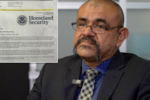In a proactive measure to ensure safety, Florida Highway Patrol (FHP) officers are now stationed at Miami-Dade County’s nine driver’s license offices. This decision comes after reports of minor safety disturbances at at least one of the county’s branches.
County officials took immediate action after a statement from Miami-Dade County Tax Collector Dariel Fernandez, issued last Thursday. The move aligns with an announcement from Governor Ron DeSantis, who revealed that FHP troopers had been deputized to enforce federal immigration laws.
“Following recent safety concerns at some of our driver license offices, we are working with the Florida Highway Safety and Motor Vehicles to ensure the well-being of our customers and employees,” Fernandez stated. The Tax Collector’s office is responsible for managing these license offices.
The troopers will now be responsible for managing safety and ensuring smooth operations at the offices, with a clear message that any threats to the facilities or disruptions will be addressed.
“We will take appropriate actions against any individual(s) who threaten the safety of our facilities or disrupt our operations,” Fernandez added.
This decision is part of a broader agreement between the Florida Highway Patrol and federal immigration authorities. Governor Ron DeSantis made the announcement on Wednesday, giving the state agency the power to enforce federal immigration laws during traffic stops or other offenses. This includes actions such as deporting individuals caught driving under the influence.
“If you have an illegal immigrant driving drunk, and they get pulled over, the FHP can take them to immigration, too,” DeSantis explained to reporters.
While the move has drawn praise from some, it also faces criticism. William “Bill” Smith Jr., president of the Florida Highway Patrol union, pointed out concerns regarding the agency’s ability to handle additional responsibilities. He mentioned that the department is already understaffed with over 100 vacancies and is struggling to keep up with growing demands.
“Troopers do what they’re told, but we keep getting more and more assignments with no additional pay,” Smith said. His concerns reflect a broader issue within the department, one that has resulted in a backlog of cases and a strained workforce.
The introduction of this measure also brings to light ongoing debates about immigration enforcement. The discussion surrounding the federal government’s role in immigration enforcement has been a hot topic since President Donald Trump’s administration. Early in his term, Trump signed multiple executive orders aiming to prioritize the deportation of individuals in the country illegally, expanding arrest priorities beyond criminals to include anyone without legal status.
However, this expansion of power is not without opposition. Thirteen state attorneys general issued a statement on January 23, arguing that using state and local police to enforce federal immigration laws is unconstitutional. They referenced the U.S. Supreme Court ruling in Printz v. United States, which prohibits the federal government from compelling states to enforce federal laws.
“We will continue to investigate and prosecute crimes, regardless of immigration status,” the statement emphasized. “We will not be distracted by the president’s mass deportation agenda.”
As Florida begins implementing these changes, the debate over immigration enforcement at local and state levels remains ongoing, with significant challenges ahead for all parties involved.
Disclaimer – Our team has carefully fact-checked this article to make sure it’s accurate and free from any misinformation. We’re dedicated to keeping our content honest and reliable for our readers.








